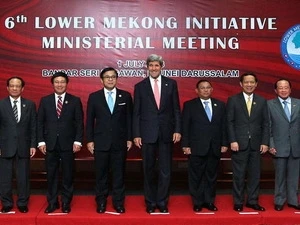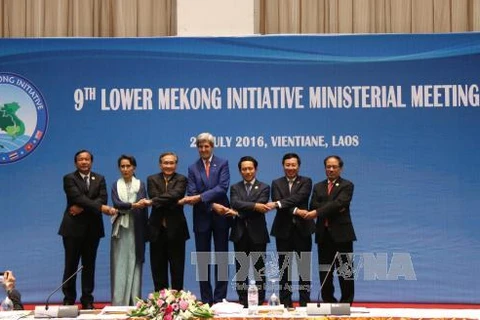Singapore (VNA) – A Vietnamese delegation led by Deputy Prime Minister and Foreign Minister Pham Binh Minh attended the 11th Lower Mekong Initiative (LMI) Ministerial Meeting in Singapore on August 3.
Speaking at the event, Deputy PM Minh described LMI as one of the leading sub-regional mechanisms on facilitating sustainable and inclusive development.
He spoke highly of achievements in cooperation projects regarding infrastructure, training, connectivity and businesses, as well as the US’s support for Mekong countries and LMI cooperation over the past nine years.
In order to further reinforce the LMI collaboration, the Vietnamese official proposed that the US should increase its sharing of experience with Mekong countries in training skilled workforce and development research.
Minh called for stronger cooperation to enhance agricultural output, improve the agriculture sector’s capacity of coping with climate change and expanding farm produce markets.
Further attention should be paid to water resource security, energy and food, especially in disaster risk mitigation, environmental protection and biodiversity, he said, adding that the LMI should help Mekong countries enhance its capacity of sustainably managing trans-border water resources, adopt new technologies to assess projects’ impacts on the environment, and build an early forecasting system for droughts and floods.
At the meeting, the Foreign Ministers from Cambodia, Laos, Myanmar, Thailand, Vietnam and the US, hailed the LMI cooperation as an important driving force for connectivity, economic integration, sustainable development and good governance in the Mekong sub-region.
They highly valued the LMI’s comprehensive approach to ensuring security of water resources, food, energy and environmental challenges, as well as the outcomes of sustainable infrastructure partnership initiative and training courses in diverse fields.
The participants adopted the reform of LMI structure in the two pillars of water resources, energy, food and environment; and human development and connectivity. Coordination in gender equality, women empowerment and public-private partnership will be incorporated into the LMI’s activities.
The meeting adopted a joint statement, a document on LMI restructure and a LMI Action Plan for the 2016-2020 period.
The LMI and Mekong River Commission (MRC) countries adopted a joint statement on strengthening management of water resource data and sharing information in the Lower Mekong.-VNA
Speaking at the event, Deputy PM Minh described LMI as one of the leading sub-regional mechanisms on facilitating sustainable and inclusive development.
He spoke highly of achievements in cooperation projects regarding infrastructure, training, connectivity and businesses, as well as the US’s support for Mekong countries and LMI cooperation over the past nine years.
In order to further reinforce the LMI collaboration, the Vietnamese official proposed that the US should increase its sharing of experience with Mekong countries in training skilled workforce and development research.
Minh called for stronger cooperation to enhance agricultural output, improve the agriculture sector’s capacity of coping with climate change and expanding farm produce markets.
Further attention should be paid to water resource security, energy and food, especially in disaster risk mitigation, environmental protection and biodiversity, he said, adding that the LMI should help Mekong countries enhance its capacity of sustainably managing trans-border water resources, adopt new technologies to assess projects’ impacts on the environment, and build an early forecasting system for droughts and floods.
At the meeting, the Foreign Ministers from Cambodia, Laos, Myanmar, Thailand, Vietnam and the US, hailed the LMI cooperation as an important driving force for connectivity, economic integration, sustainable development and good governance in the Mekong sub-region.
They highly valued the LMI’s comprehensive approach to ensuring security of water resources, food, energy and environmental challenges, as well as the outcomes of sustainable infrastructure partnership initiative and training courses in diverse fields.
The participants adopted the reform of LMI structure in the two pillars of water resources, energy, food and environment; and human development and connectivity. Coordination in gender equality, women empowerment and public-private partnership will be incorporated into the LMI’s activities.
The meeting adopted a joint statement, a document on LMI restructure and a LMI Action Plan for the 2016-2020 period.
The LMI and Mekong River Commission (MRC) countries adopted a joint statement on strengthening management of water resource data and sharing information in the Lower Mekong.-VNA
VNA























